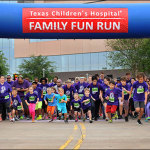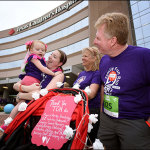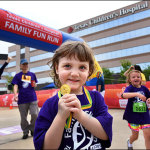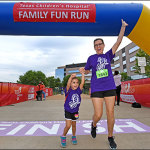Two decades after Texas Children’s Hospital opened its doors in 1954, the hospital’s medical staff was called on to care for one of the most famous patients in the world – David Vetter, better known as “the bubble boy.”
David’s life, Texas Children’s involvement in his care and the advancements that have been made in the field of immunology, allergy and rheumatology were the topic of two recent Forums Luncheons hosted by our Office of Development to help engage current and potential donors in our mission.
At the River Oaks event and the one held in The Woodlands, former members of David’s care team and members of David’s family described the little boy’s historic journey, which began on September 21, 1971, at Texas Children’s Hospital.
“David was born with severe combined immunodeficience or SCID,” said Dr. William Shearer, the former section chief of Allergy and Immunology. “The hereditary disease, which dramatically weakens the immune system, forced David to live in a clear sterile chamber that resembled a bubble.”
Shearer and other members of Texas Children’s medical staff, including Dr. Imelda Hanson, a physician in Immunology, Allergy and Rheumatology, cared for David until he died of Burkitt’s lymphoma on February 22, 1984, four months after receiving a bone marrow transfusion from his sister. It was later discovered that her marrow contained traces of a dormant virus – Epstein-Barr – which had been undetectable in the pre-transplant screening.
But, as former members of the boy’s medical staff explained, neither David’s life nor his death were in vain.
The dark-haired boy whose face covered magazines across the globe changed the face of immunology here at Texas Children’s and nationally, giving children born today with SCID a good chance at living a normal life. David, who would have been 40 this year, also paved the way for Texas Children’s Hospital to become an international referral center for families worldwide seeking hope and advanced, comprehensive diagnoses, treatment and care, said Physician-in-Chief Dr. Mark W. Kline.
“A few years after David’s passing in 1989, Texas Children’s Hospital was still primarily a regional hospital,” Kline said at the luncheons.” Today, we treat patients from all 50 states and about 60 countries. In fact, we are now an international referral center for some of the world’s most complex cases.”
Many of those cases are children with SCID and almost all benefit from the great strides in SCID research Shearer and Hanson have made after David’s death.
Shearer, for example, helped create the David Center at Texas Children’s Hospital. The center provides state-of-the art care and cutting-edge research for immune system diseases that make children susceptible to auto immunity and infectious diseases. Hanson works with federal and state health agencies to institute newborn screening options for children with SCID and other immune deficiency disorders in Texas and throughout the United States.
David Vetter’s mother, Carol Ann Demaret, said at the luncheons that she cannot express how much the care her son received at Texas Children’s Hospital means to her and her family.
“I am so grateful to Texas Children’s Hospital for giving my family 12 years with our son we never would have had otherwise,” she said. “I could work for the hospital for 100 years and still never repay them for that gift.”
































